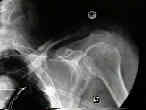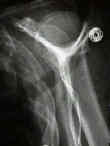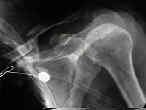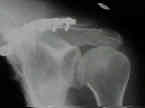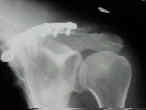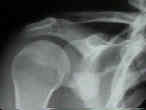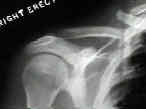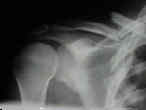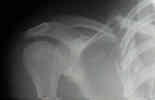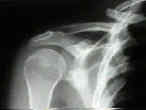by James J. Davidson MD
- Discussion:
- refers to scapular frx and clavicle frx (or AC joint injury);
- single disruptions:
- common injuries, often w/ minimal displacement;
- types:
- midshaft clavicle fracture
- distal clavicle fracture
- AC separation
- scapular body fracture
- scapular neck fracture
- glenoid fracture
- double disruptions:
- rare, high energy injuries;
- integrity compromised (ring/ring, strut/strut)
- ring/strut combination potentially unstable
- involves clavicle frx (or AC separation) which occurs along w/ scapular frx;
- functional / healing limitations
- surgical treatment indicated
- surgical treatment:
- ORIF of simpler fracture (see ORIF of claviclar frx)
- reevaluation of displacement of remaining disruption
- ORIF if needed based on displacement
- Physical Examination:
- r/o respiratory distress
- note any decreased BS left/SQ emphysema
- look for foreshortened shoulder girdle
- palpate for prominent midshaft clavicle;
- NV exam
- Surgical Results:
- Herscovici D, et al (1992)
- 9 patients with ipsilateral midshaft clavicle/ scapular neck fx ("floating shoulder")
- 7 ORIF clavicle, 2 nonoperative
- 4 year avg follow-up
- 7 operative excellent
- 2 nonoperative fair or poor with pain, deformity, decreased ROM
- all fractures united
- Leung and Lam (1993)
- 15 patients with "floating shoulder"
- all fractures treated with ORIF
- 25 month avg. follow-up
- 14/15 good or excellent (1 activity-related moderate pain
- all fractures healed at 8 weeks avg;
- Ramos L, et al (1997)
- 13 patients with "floating shoulder"
- managed nonoperatively
- all fractures healed
- 7.5 year avg. follow-up
- 92% good or excellent
- 3 patients had shoulder asymmetry
- complications:
- delayed union/nonunion
- malunion
- impingement
- decreased function (strength, mobility)
- early degenerative changes
- NV compromise
-------------------------------------
Double disruptions of the superior shoulder suspensory complex.
The floating shoulder: ipsilateral clavicle and scapular neck fractures.
Open reduction and internal fixation of ipsilateral fractures of the scapular neck and clavicle.
Conservative treatment of ipsilateral fractures of the scapula and clavicle.


